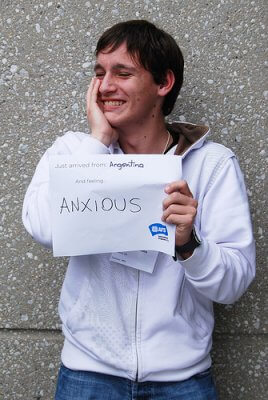Signs of Anxiety – When Does it Become Anxiety Disorder?

By: Eli Christman
Worried all the time lately? When is it signs of anxiety, and when is it more than just anxiety and an anxiety disorder?
Key facts about anxiety and mental health
It’s important to understand that mental health is not an exact science. Mental health ‘disorders’ are not illnesses you can see under a microscope. They are general terms created by mental health professionals to help describe groups of people with similar symptoms.
So there is often crossover when diagnosing mental health issues. For example, between anxiety and stress, and between anxiety and anxiety disorders.
[Know your anxiety is out of control, but going to a therapy office makes you more anxious? Why not get help from home? Book an online therapist now and start feeling better.]
Anxiety and stress
With stress, we know what it is we are upset about. It’s just that we are very overwhelmed and feel unable to cope. We feel frustrated, and can be angry or sad.
‘Everyday anxiety’ is often really a form of stress. Something has happened in life that has us worried all the time. This might be losing our job, a big presentation, or a life change.
Anxiety, however, is more vague in its cause. We suddenly feel scared about our future, and our thoughts become increasingly illogic. If we think what we think we are anxious about, we then just feel anxious about something else.
Once we are in a state of anxiety, we can overreact to everything. Something small, like a stranger looking at us funny on a train, can leave us feeling afraid.
[For more on this front, go to our article on ‘Stress vs Anxiety – What is the Difference?‘].
When stress becomes anxiety
Stress can trigger anxiety. We start off upset about something in particular, but then we find we are worried about everything, and not just frustrated but fearful.

photo by Rodnae production for Pexels
This can happen if we are faced with too many stressors at once. For example, if we lose a loved one and have a financial crisis at the same time.
But in general, this happens because we were already prone to anxiety.
Signs of anxiety and anxiety disorder
The symptoms of anxiety and anxiety disorder are the same. The difference is in how long you experience the symptoms, and in their severity. And many of these symptoms also are seen in cases of severe stress.
Anxiety symptoms can be divided into categories: mental symptoms, emotional symptoms, and physical symptoms.
Mental symptoms can include things like:
- obsessive and increasingly illogic thinking
- a feeling like your mind is on overdrive, troubleshooting everything
- always thinking of the future and how you can control it
- negative thinking: exaggerated, black and white, doom and gloom.
Emotional symptoms can include things like:
- mood swings, such as sadness and anger
- feeling on edge all the time
- overreacting to things.
Physical signs of anxiety can include things like:
- jumpiness
- sleep problems
- changes to eating patterns
- panic attack that cause racing heart, sweatiness, dizziness
- muscle tension, headaches, stomach upset.
For more about anxiety symptoms, read our ‘Guide to Generalised Anxiety and Panic Disorders‘.
The roots of anxiety and anxiety disorder
Again, anxiety can happen if the stress in your present day life becomes so out of control it’s beyond the realm of human coping.
And anxiety can be a symptom of PTSD triggered by a devastating experience. This includes things like your house burning down, watching someone you love die, being the victim of crime, living through natural disaster or terrorism, etc.
But in most cases, anxiety doesn’t just descend out of nowhere. It tends to be a mix of environmental and genetic factors that leave us anxious adults.
Childhood causes for anxiety and anxiety disorder
Childhood is a key factor behind most cases of anxiety. It could be that a childhood trauma left you believing the world is a dangerous place and living with complex PTSD, with anxiety as a key symptom. Or you might have experienced unstable environments as a child, like poverty, or a sick parent.
Sometimes it’s the way we were parented that left us with an anxious personality. It could be that you had an anxious parent and learned to respond to stress by overthinking.
We might not have received enough ‘attachment’, meaning there was not an adult we could trust to be a safe, loving and reliable go-to. We end up with ‘anxious attachment disorder’, meaning relationships cause us great stress.
Finally, some people do seem to be born more prone to anxiety than others. We can have a sensitive personality. And some research shows anxiety might be genetic.
Anxiety or signs of anxiety disorder?
So when does anxiety become a disorder? When anxiety is controlling your life, and has been doing so for at least a few months.
Most people whose anxiety is based on unresolved childhood issues will have generalised anxiety disorder. Life will be affected on a daily basis by anxiety. Decision making is driven by trying to avoid feelings of fear.
If we have done therapy for our anxiety, however, and know how to control it when it gets triggered? Then we can start to experience anxiety in a way that is no longer a disorder as it is not controlling us. We are controlling our anxiety.
The different types of anxiety disorder
Anxiety disorder can manifest differently for different people. There are many types of anxiety disorder, with the most common ones being:
Generalised anxiety disorder: you are anxious all the time, you make decisions based around your anxious thoughts and fear, and it’s been going on for several months or a lot longer.
Social anxiety disorder: Your anxiety triggers when you have to interact with others. The more anxious you are, the less you go out of the house.
Obsessive compulsive disorder: Your anxiety leads you to compulsions and repeat behaviours.
Post-traumatic stress disorder (PTSD): this is really a trauma disorder, where you have experienced one or several overwhelming experiences. But anxiety is a main symptom.
When is it time to seek help?
Life throws curve balls. So we all at some point feel overwhelmed and anxious. But a good rule of thumb is that if your stress and anxiety has been going on for two months or more, and you feel it is negatively affecting your daily life and ability to cope? It’s time to seek support.
Ready to put an end to a life led by anxiety? We connect to London’s top therapists in central locations. Not in London or the UK? Find UK-wide therapists on our booking site, or an online therapist you can talk to from anywhere.
Still have a question about signs of anxiety or anxiety disorder? Ask in the pubic comment box below.






Hey i was wondering if you could give me an explanation on what causes my anxiousnes so I’m very anxious in public but mostly toward people i know, and asking a simple question to a store cashier also in school i hate performing dance and drama is a killer thing to me mainly i think its because i have a lack of self confidence and its infront of my friends that i see all the time if random people were in my dance class it would be better but still bad i was getting so worried my mam had to call the school and tell them if i could watch or do it by myself with her i missed so many days off school cause i wouldnt want to do dance i am one of the kids to get attention in class as i tend to answer questions which baffles me because if i can answer questions shouldn’t i be able to perform i always hated plays i used to always be a prop man or background back in primary also award ceremony i am in higher set in school so i tend to get alot off award but i was so anxious off going up on stage dropped my award off of shaking in anxiousness do you thi k you could help?
Hi Charlie, if it’s anxiety to the point you are missing school to be honest we’d suggest talking to your GP and getting a referral to speak to a counsellor who can take the time to get to know you and work to get to the bottom of this. It would be unprofessional and unhelpful of us to try to diagnose without knowing you. And note there are also many free hotlines in the UK if you ever just want someone to talk to, here is a list including ones that specialise in helping young people http://bit.ly/mentalhelplines. This level of anxiety can sometimes be something we naturally grow out of when we grow up, leave home, and become independent, especially if we are in a household where we have to please our parents or have strict parents. But if it is related to any form of childhood trauma or a previous difficult experience then you will need support to work through it. Finally, go easy on yourself. Being a teenager can be tough. You are doing the best you can, and that is what matters. And not everyone is extroverted – some of us are introverted naturally, performing in front of others isn’t for everyone. Read our free guide to performance anxiety! https://www.harleytherapy.co.uk/performance-anxiety-help-guide.htm
Hy, Charley
I am worried about my family life. I recently got married I can’t trust my husband there is no any reason to do i. To be hones it’s not I can’t trust him it’s like I am afraid to lose him. Whatever he dose I feel like he is cheating on me or he is trying to leave me . I don’t know what to do. I talked with him already about this he says that he also under pressure because of my this attitude. I have a very bad experience with long term relationships and I suffer lot . I really need to stop this I am trying my best I don’t know to do . Could you plz help me with this . I love him so much I don’t wanna lose him . thank you